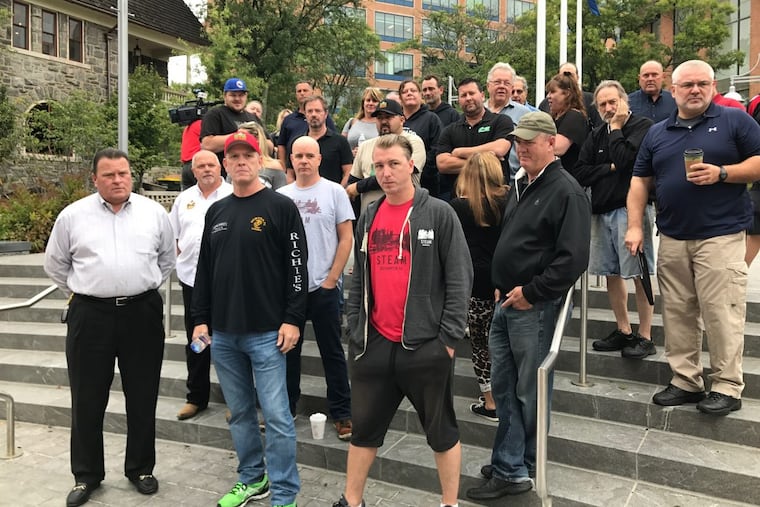Video gaming machines in Pa. bars? Not so fast
Saying changes in state beer laws are hurting them, tavern owners want the state to approve video gaming terminals in Pennsylvania's bars. Casino interests object.

July is usually the busiest time of the year for sales from the to-go cooler at McStew's Irish Pub in Levittown. In 2016, takeout sales accounted for $81,000 in revenue.
In July 2017, it was $64,000.
The state's new law allowing six-packs to be sold in grocery stores and breweries has seriously diluted bar owners' once-lucrative takeout business — a trade that usually accounted for nearly half of the revenues at McStew's, said owner Tom Tyler.
He and other tavern owners around the state have a proposal for making up that lost revenue: Bring video gaming terminals to Pennsylvania's bars.
A gambling package this year — which stalled out in Harrisburg — would have allowed video gaming terminals, or VGTs, in not just bars but also corner markets, veterans' halls, and (almost) anywhere with a liquor license. The machines offer games of chance with the promise of payout — or at least a shot of entertainment to go with your shot of whiskey.
Not only would legalizing video gambling help plug the state's $2.2 billion budget gap, proponents argue, it would give their industry a chance to stay competitive in a rapidly changing environment.
"This is now a matter of survival," said Tyler, who predicted he could bring in $100,000 with five legal video terminals — and said that for each month this year, his revenue has been lower than in any of the previous nine years he's been in business. "It's not something we want; it's something we need."
But the bar owners face formidable obstacles. The VGT issue has been a sticking point in state budget negotiations — and if casinos have their way, the machines would never arrive in Pennsylvania. The package allocated $200 million for the state budget in taxes, but in reality, it is hard to predict exactly how much money VGTs would bring in for the state and how much they could take away from current casino revenue.
"Anytime a state is banking on additional revenue to come from gaming, you're basically rolling the dice. … There's no guarantee," said gambling expert Alan Silver, a professor at Ohio University. "You might make $200 million, but you might take away $300 million from the casinos in tax revenue."
Proponents in Pennsylvania contend that VGTs could bring in $500 million in state taxes and $53 million in county and local taxes, according to estimates by Commonwealth Gaming using assumptions based on participation and rates in Illinois, where the machines were recently legalized. They estimate that about 37,000 terminals could potentially be installed statewide.
"The money we could gain through this is astronomical," said Jerry Walsh, whose chain, Big Heads, was down half a million dollars because of the to-go sales switch. He wondered why politicians "don't get it."
Those who want VGTs have said there are "tens of thousands" of illegal machines already in bars across the state. "In addition to bolstering the bottom lines of our local clubs and taverns, legalizing VGTs will help to eliminate the 'underground' video poker economy," State Rep. Paul Costa (D., Allegheny) said at a news conference last year.
But Republicans in the Senate who oppose VGTs have lately signaled that they may seize upon that argument; Sen. Chuck McIlhinney said a Tuesday committee hearing would focus on "ending this scourge of illegal VGTs."
"I think it is important that we show the people of Pennsylvania we can address the problem of illegal VGTs before we talk about adding 55,000 new machines into venues across the state," McIlhinney said in a statement.
Meanwhile, the casino industry has put out two anti-VGT ads, and Sands, which has a casino in Bethlehem, formed a group with the support of other unidentified casinos to lobby against it.
"It's going to impact local communities by adding what in essence would be about 40,000 mini-casinos around Pennsylvania," said Mike Barley, a Harrisburg lobbyist working for the group Pennsylvanians for Responsible Government. "In the rush to get revenue for the state, it's so important to remember, or to put at the forefront, what is good public policy."
He, like others, added that people should be concerned about what effect having gambling machines outside casinos would have on local communities. Some state lawmakers have argued that installing slot machines in "stop-and-gos" would bring problems to neighborhoods.
In Illinois, crime went up in places with access to VGTs, according to University of Illinois researchers who studied what happened in the state after video gambling was introduced in many areas, although not Chicago.
"On average, being near at least one video gambling establishment is associated with a 6.7 percent and 7.5 percent increase in property and violent crime," says the study, published in August.
According to the state, the machines brought in more than $1 billion in net income in fiscal year 2016, more than $255 million of which went to a state projects fund.
In spite of the major hurdles to legalization, the bar owners are heartened by Illinois' numbers, and say the machines are what their customers want. Martin Hoeger, who runs Steam Pub in Southampton, said he was not worried the machines would bring crime to the area around his bar.
"With the legalized gambling and these big casinos opening up, I lose customers on a daily basis," said Hoeger. "In this business, you always feel like there's somebody trying to take away your livelihood."